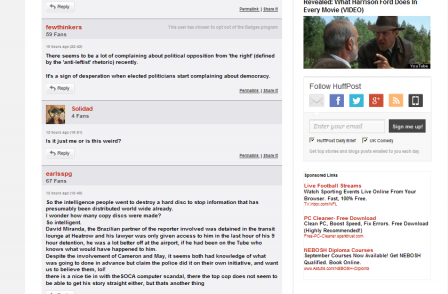
The saying 'read the small print’ certainly applies to the new Defamation Act (which has been passed and is due to come into force within the coming weeks).
There’s plenty of it: the all-important Explanatory Notes run to 7,000 words, 84 points in all. Plus 47 FAQs and 20 cross references.
Just what a busy news editor needs when making a decision on a story in a hurry.
The Act will certainly benefit journalists and publishers. They should face fewer libel actions, especially from businesses.
Qualified privilege has been extended to several new areas. And the new public interest defence should be far easier to use than the Reynolds Defence. Libel tourism should be minimised.
But the expected benefits for web editors regarding user-generated content, are likely to be outweighed by the confusion and administration they will create.
The Act provides a new ‘Section 5’ defence which will protect website operators from libel claims arising from defamatory reader comments.
But this is an additional defence. It doesn’t replace for existing laws.
So website operators will have to choose which defence to use at an early stage. And the rules for each are completely different.
The new Section 5 defence allows operators to keep an allegedly defamatory comment online, even after a complaint.
But the existing defence, under the European E-Commerce Directive, says the comment should be removed immediately.
So which do they choose?
If they opt for Section 5, they will have to engage in some detailed technical correspondence, both with the person who has complained, and with the person who posted the comment. This correspondence must be sent, and responded to, within very strict timescales. And there is a multiplicity of decisions as to what to do next, depending who-says-what-to-who, or when no-one-says-what-to-nobody.
So website operator will need to keep detailed records of dates and times; and analyse replies carefully, in order to determine what to do next.
Will they bother?
Put it this way. Imagine you were a website operator, and someone complains about a web post. Which would you prefer to do:
- Use the existing law – take the post down immediately and forget about it, OR
- Use the Section 5 defence – and spend up to 14 days exchanging detailed correspondence with two different parties – and hope you win a libel action if there is one.
I know which I’d prefer, especially as Section 5 is untested, and much of it is still unexplained.
And I suspect that other website operators will do the same.
In my view, they would be daft not to.
Cleland Thom is a consultant in media law.
He offers further advice on using the Defamation Act in his new eBook. The book summarises all the changes in libel law, and explains how to use them.
Email pged@pressgazette.co.uk to point out mistakes, provide story tips or send in a letter for publication on our "Letters Page" blog
